Why AI in Agriculture Is Transforming Farming Practices
Table Of Content
Published Date :
01 Sep 2025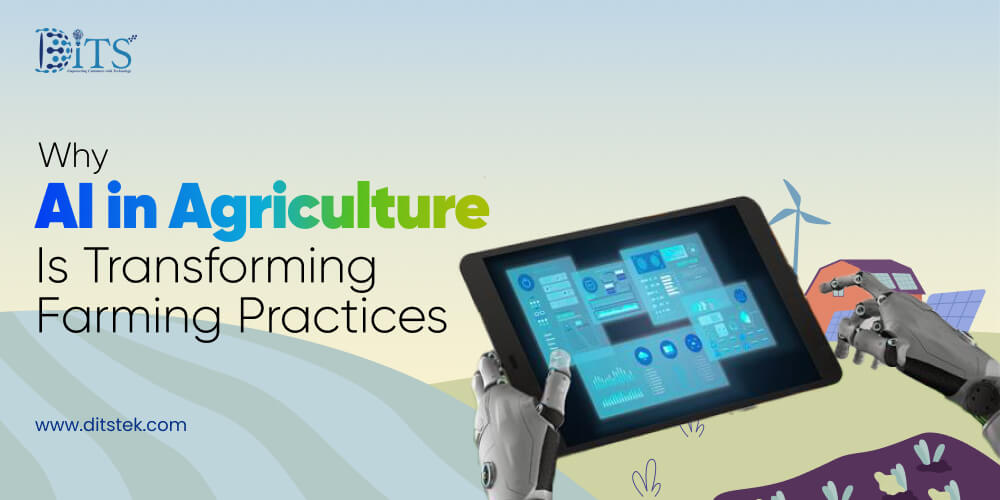
Agriculture is entering a new era where data and technology are transforming the way farms operate. From predicting weather patterns to monitoring soil health, the use of AI in agriculture is helping farmers make smarter decisions and improve efficiency. With the increasing global demand for food, agricultural businesses are under pressure to boost productivity while keeping costs and resources in check.
Artificial Intelligence (AI) offers the tools to meet this challenge by automating operations, minimizing risks, and maintaining sustainability. This shift marks the beginning of a more innovative and resilient farming industry prepared to tackle modern challenges. This blog shares the role of artificial intelligence in agriculture and its impact on farming practices.
The Current Challenges in Agriculture
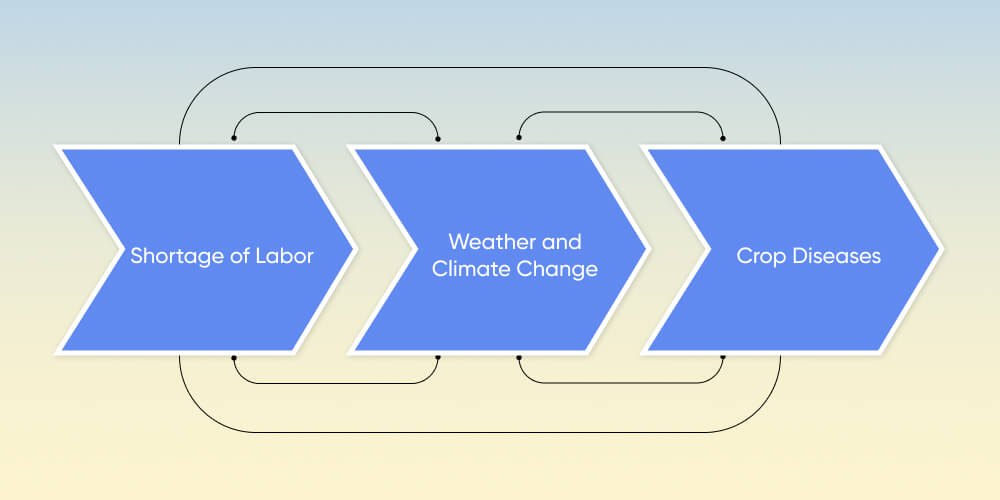
Agriculture is the backbone of the global economy, but farmers and agribusinesses continue to face a set of growing challenges.
Shortage of Labor
One of the biggest issues agriculture businesses face is the labor shortage. Fewer people are entering the farming workforce, which makes it challenging to keep up with rising production demands. Along with this, operational costs for fuel, fertilizers, and machinery are also increasing, impacting the profits for farmers.
Weather and Climate Change
Another pressing concern is the impact of climate change on crops and yield. Unpredictable weather patterns, droughts, floods, and irregular rainfall make it harder for farmers to plan crops and protect yields. Soil health is also declining in many regions, leading to reduced productivity and higher dependence on chemical-based fertilizers.
Crop Diseases
Crop diseases and pest infestations add further risks. Without early detection, they can spread quickly and damage large portions of a harvest. Supply chain disruptions are another challenge, often leaving businesses vulnerable to delays and market price fluctuations.
Together, these challenges make traditional farming less reliable and sustainable. To overcome them, agricultural businesses are increasingly turning toward modern solutions such as AI applications in agriculture. These AI tools provide real-time insights, predictive analytics, and automation to address these long-standing issues.
Read Portfolio: Smart Farm Monitoring System with AI Air Quality!
AI-powered smart farm monitoring system with ammonia sensor barn tracking, real-time alerts, and predictive insights for safer, compliant operations.
Key Benefits of AI for Agriculture Businesses
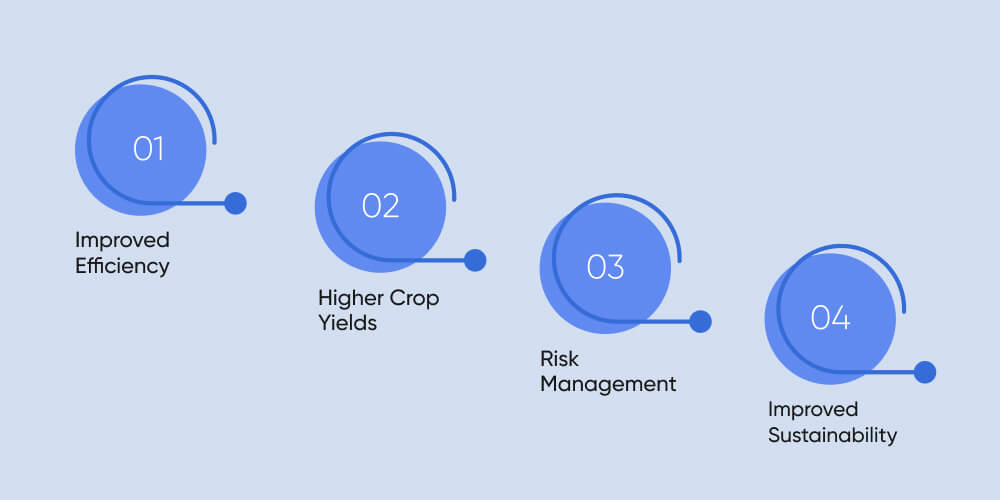
The benefits of AI in agriculture are becoming more visible as businesses adopt intelligent solutions across their farming operations. By applying AI tools to everyday processes, agribusinesses can improve efficiency, reduce costs, and make more informed decisions.
Improved Efficiency
One of the most significant advantages of using AI in agriculture is efficiency. AI-powered systems automate routine tasks such as crop monitoring, irrigation scheduling, and harvesting, freeing up time and reducing labor needs. This not only addresses labor shortages but also cuts operational expenses.
Higher Crop Yields
Another benefit is improved crop yield. AI analyzes data on soil, weather, and crop health, ensuring that resources like water, fertilizer, and pesticides are used in the right amount at the right time. This precision farming approach leads to healthier crops and higher outputs without wasting resources.
Risk Management
AI also strengthens risk management for farmers. Predictive models can warn farmers about potential pest attacks, diseases, or unfavorable weather conditions in advance. With these insights, businesses can act early and prevent significant losses.
Improved Sustainability
Sustainability is another critical gain. By minimizing excessive chemical use and optimizing water consumption, AI-driven systems promote eco-friendly farming. This not only benefits the environment but also helps businesses align with global sustainability standards.
Finally, AI enables better long-term planning. By turning data into actionable insights, agribusinesses can make strategic decisions about crop selection, market opportunities, and resource allocation. These insights ensure businesses remain competitive in an evolving industry.
Overall, the benefits of AI in agriculture go far beyond technology; they represent a shift toward smarter, more sustainable, and profitable farming practices.
Real-World Use Cases of AI in Agriculture
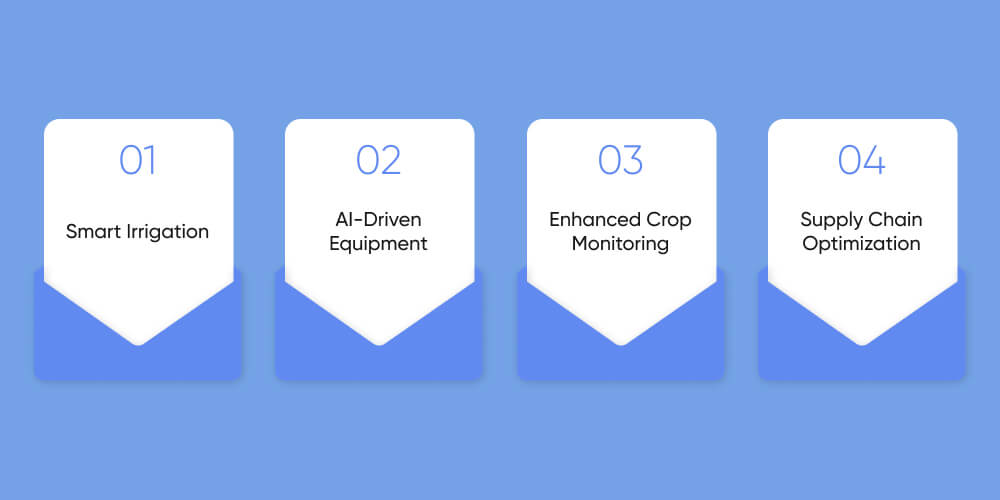
The most convincing way to understand AI’s potential is by looking at real-world examples of AI in agriculture. Agribusinesses across the globe are already adopting innovative AI tools that make operations faster, more efficient, and more sustainable.
Smart Irrigation
One popular use of AI in agriculture is smart irrigation systems. By combining AI with the use of IoT in agriculture, farmers can monitor soil moisture in real time and automatically adjust water flow. This prevents over-irrigation, conserves water, and ensures crops receive just the right amount of hydration.
AI-Driven Equipment
Autonomous tractors and AI-driven machinery are another example. These machines can plow fields, plant seeds, and spray crops without human intervention, reducing labor costs and ensuring precision in every task. AI driven machines not only saves time and effort, but also ensure precision in every task.
Enhanced Crop Monitoring
Drone-based crop monitoring is also widely used. Equipped with AI-powered imaging systems, drones scan fields to identify stressed plants, nutrient deficiencies, or pest damage—helping farmers take quick corrective action.
Supply Chain Optimization
Supply chain optimization is another area where AI is creating value. From predicting demand to setting accurate market prices, AI ensures agricultural businesses remain competitive in volatile markets.
DITS has seen firsthand how AI adoption drives success. At our company, we integrate AI into software development, quality assurance, and customization, ensuring solutions for agribusinesses are not just functional but intelligent. This focus on innovation helps companies achieve practical results with scalable technology.
Read Portfolio: Smart Greenhouse Automation with IoT!
IoT-driven smart greenhouse automation with climate control, soil moisture sensors, and Hortimod OS for precision agriculture and higher yields.
Implementing AI in Your Farming Operations
For many agribusinesses, the idea of adopting AI may feel complex, but in reality, it can start with small, practical steps. The first step is identifying areas where AI can make the biggest difference; whether it’s predicting yields, automating irrigation, or detecting pests early. Once those needs are clear, businesses can explore the right tools and partners to get started.
Working with an experienced AI software development company is often the best way to ensure success. These experts can design tailored solutions that fit specific farming needs instead of relying on generic off-the-shelf products. From crop monitoring systems to predictive market analytics, AI can be customized to match the unique requirements of each agribusiness.
Another key part of implementation is choosing the right technologies. For instance, farms that already rely on IoT sensors for monitoring soil and weather can enhance their systems through AI software development and advanced data integration. This allows decision-making to move from reactive to proactive.
AI is also opening new communication possibilities. For example, custom AI chatbot development can help agribusinesses engage with distributors, suppliers, or even customers more efficiently, offering instant updates on inventory, shipments, or market conditions.
At DITS, we integrate AI into every software we build, covering development, quality assurance, code maintenance, and customization. By doing this, we ensure agricultural businesses can adopt AI solutions that are scalable, reliable, and aligned with long-term growth strategies.
The Future of AI in Agriculture
The future of farming is bright, with AI in agriculture playing a central role in crop growth, management, and distribution. As farms continue to adopt smart technologies, we will see a tighter integration of AI with other innovations, particularly IoT.
One emerging trend is the combination of AI with IoT integration in agriculture. By linking AI-powered analytics with connected devices such as soil sensors, drones, and automated machinery, farms can operate as fully connected ecosystems. This allows every stage of the farming process, from planting to distribution, to be monitored and optimized in real time.
Another area gaining traction is climate-smart farming. AI-driven models will help predict the long-term effects of changing weather patterns, enabling farmers to make informed choices about crop selection, irrigation cycles, and resource allocation. This ensures sustainability while meeting the rising global demand for food.
Supply chains will also become more resilient. AI will improve logistics planning, reduce waste, and match produce with demand more accurately. Combined with IoT software development, businesses will be able to track goods across the entire value chain with better transparency and accountability.
For agricultural enterprises, the future is about scalability. Instead of one-size-fits-all solutions, AI platforms will be customized to meet the needs of smallholder farms, mid-size businesses, and large-scale operations alike. This adaptability is what makes AI such a powerful long-term investment.
Ultimately, the future of farming lies in blending traditional wisdom with digital intelligence. Businesses that embrace these innovations now will be better positioned to thrive in a rapidly evolving agricultural landscape.
Ready to Transform Your Farming Operations?
Discover how AI can optimize your yields, reduce costs, and future-proof your farm. Fill out the form to explore tailored solutions for your agribusiness today.
Why Choose DITS for AI Software Development for Agriculture
At DITS, we specialize in delivering tailored AI software development solutions that help agriculture businesses unlock real value from their operations. Our expertise spans across integrating AI into farming tools, automating processes, and building predictive systems that drive efficiency and growth.
We also leverage AI for software development, quality assurance, code optimization, and customization to ensure every solution is robust and scalable. With experience in IoT, workflow automation, and data-driven technologies, we provide end-to-end support, helping agribusinesses adopt AI confidently and transform traditional practices into smarter, future-ready systems.
With a decade of experience in agriculture software development, DITS can help agriculture businesses integrate AI into every process to improve efficiency and save time and effort. We understand the specific requirements, dive into the details, and create an AI software development plan to build a solution that makes farming not only convenient but profitable.
Conclusion
The shift toward smarter farming is no longer a future vision; it’s already happening right now. By adopting AI in agriculture, businesses can overcome long-standing challenges such as labor shortages, unpredictable weather, and resource inefficiencies. From precision farming to predictive analytics and automation, AI equips farmers with the tools to improve productivity, sustainability, and profitability.
For agriculture businesses, the message is clear: integrating AI today means staying competitive tomorrow. Those who embrace intelligent technologies will not only protect their yields but also secure their role in building a resilient, future-ready food system.
FAQs
What is AI in agriculture?
AI in agriculture refers to applying artificial intelligence technologies, like machine learning, computer vision, and robotics, to farming. It helps farmers analyze soil, crops, and weather data to make more informed decisions. By combining AI in farming with precision tools, growers can boost yields, reduce waste, and make agriculture more sustainable and profitable.
How is AI used in agriculture?
AI in agriculture is widely used for precision farming, crop monitoring, and pest control. AI-powered drones and sensors assess soil and plant health, while predictive analytics improve yield forecasts. Farmers also benefit from AI applications in farming supply chains, enabling smarter resource management, reduced costs, and higher agricultural productivity worldwide.
How can an AI software development company help my agribusiness?
An experienced AI software development company can design custom solutions that fit your farming needs, such as smart irrigation, pest detection, and predictive market insights. They ensure scalability, integration with existing systems, and long-term value.
How are AI and ML used in agriculture for disease detection?
AI and ML in agriculture enhance disease detection by analyzing crop images with computer vision and predicting outbreaks using environmental data. Machine learning algorithms identify leaf patterns, while IoT sensors provide real-time monitoring. These AI applications in agriculture allow farmers to respond faster, safeguard crops, and maintain consistent yields.
What are common AI applications in agriculture?
Common AI applications in agriculture include precision irrigation, soil analysis, crop health monitoring, pest and weed detection, yield prediction, and automated harvesting. Farmers also use AI-powered drones and robots for data collection and farm management. These AI applications in farming drive efficiency, sustainability, and better profitability across agricultural operations.
What are some practical AI in agriculture examples?
Examples include drone-based crop monitoring, AI-powered irrigation systems, automated tractors, and predictive analytics for yield forecasting. These solutions help optimize resources and increase efficiency.
What are the benefits of AI in agriculture?
The benefits of AI in agriculture include higher crop productivity, reduced water and fertilizer use, and early detection of diseases and pests. AI in farming improves sustainability, lowers operational costs, and helps farmers adapt to climate challenges. Ultimately, AI applications in agriculture enhance profitability while supporting global food security.
Is AI adoption in farming cost-effective for medium-sized businesses?
Yes. While the initial investment may seem high, the long-term savings from reduced labor, optimized inputs, and higher yields often outweigh the costs, making AI adoption highly cost-effective.
Can AI be integrated with existing IoT systems on my farm?
Absolutely. With proper IoT integration in agriculture, AI can enhance the performance of connected devices such as soil sensors, weather stations, and automated machinery, creating a fully optimized smart farm ecosystem.

Dinesh Thakur
21+ years of IT software development experience in different domains like Business Automation, Healthcare, Retail, Workflow automation, Transportation and logistics, Compliance, Risk Mitigation, POS, etc. Hands-on experience in dealing with overseas clients and providing them with an apt solution to their business needs.
Recent Posts
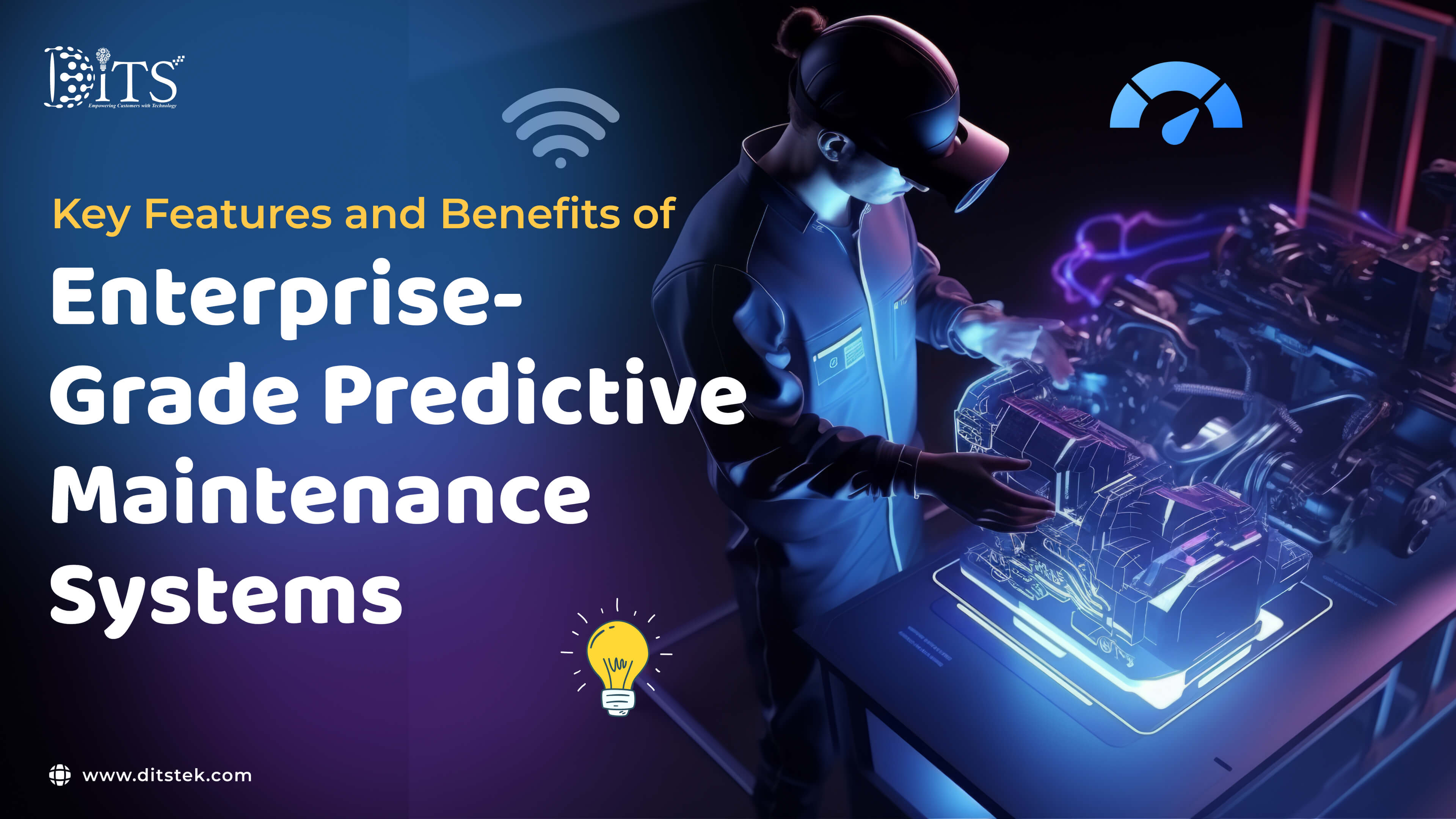
Explore predictive maintenance software features that reduce downtime, cut costs, and boost efficiency with enterprise-grade, AI-powered maintenance systems.
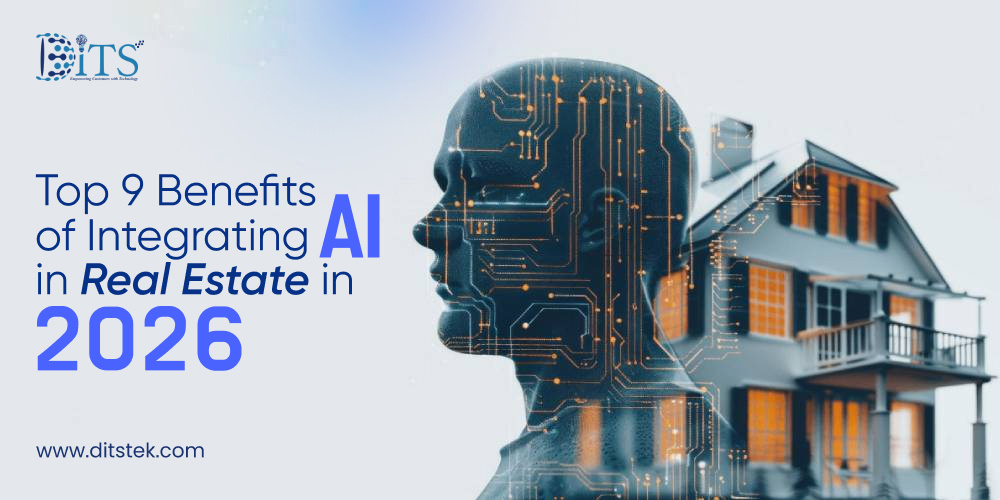
Benefits of AI in real estate include better cash flow planning, improved marketing ROI, stronger pipeline visibility, and scalable growth.

We at DITS offer custom Population Health Management Software Solutions to help you measure the effectiveness and efficiency of care delivery to patients. Read our blog to know in detail.